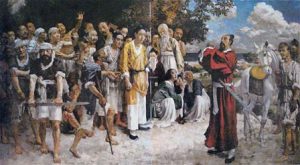This uprising, which started in 1850 and ended fourteen years later, was the greatest peasant rebellion in China in the 19th century. The 18th had seen a rise in China’s population from 150 to 350 million – more than double – and by 1850 the figure had risen to 450 million. This extraordinary fertility was not matched by any increase in cultivable land, so the peasants, among whom the population rise was marked, were worse off than they had ever been. The majority could not pay their bills, taxes or rents, and were therefore dispossessed and homeless. Something had to give.
What happened was a series of peasants’ revolts lasting twenty years from 1850. Part of the North China Plain, between the Huai and Yellow rivers, came under the control of the Nian rebels. In Yunnan the Chinese Muslim population rose up between 1862 – 1873, and the Miao natives revolted in the Kweichow mountains from 1854 – 72.
By far the most serious of these rebellions began in the hinterland of Canton, now Guangzhou; this was the so-called Heavenly Kingdom of Great Peace, or Taiping Tuanguo, and involved many resident foreign missionaries and Western merchants. The leader of the revolt came from a poor peasant family himself. He was called Hong Xiuquan, and had had hallucinations leading him to believe that he was the brother of Christ. Indeed, he had been converted to Christianity by the missionaries, believed in the Divinity of Christ and the Ten Commandments. He formed a society and welcomed into it all the poor (such as landless, houseless peasants), workers in handicrafts, miners and charcoal burners, all of whom could be put to work in a kind of primitive Communism.
One of his proclamations said: ‘land, food, clothing and money must be held and used in common, so that there is no inequality anywhere and nobody lacks food or warmth.’ As the Taiping advanced across country to Central China, hapless local officials, the wealthy who lived in large houses or farms, unpopular landlords and so on suffered the usual punishment for such impertinence – beheading with their families. The Leader announced that he would put the Manchus to the sword.
In 1853 Nanjing itself was taken by the rebels, and became their headquarters for the next eleven years. Had the Taiping coordinated their revolt with the Nian in the far north of China, and the ‘Red Turbans’ in the south, the Quing Dynasty (q.v.) would surely not have survived. The latter were having enough trouble fighting the French and British in the Opium Wars at the time.
Though most of the Yangzi Valley came under rebel control, supremely important because this was the richest part of China, the revolution began to break up in the customary way of all rebellions: internal factions, infighting and bickering between would-be leaders. Most of the original, and arguably genuine, idealistic leaders were murdered, and the new leaders lived a luxurious life while peasants went back to being peasants, as was to happen in the Russian Revolution. The new leaders organised palatial harems for themselves, and taxed the poor to pay for them. The original authorities meanwhile were not idle; they raised properly paid militias, and the Quing Dynasty received gifts of money and arms from Western Powers, who after all had trained Imperial troops under ’round-eyed’ foreign generals such as ‘Chinese Gordon’.
In 1864 Nanjing was re-captured and Hong Xioquan ‘died while resisting arrest’. Destruction of Central China had been so total that it took decades to recover. The Manchu Quing Dynasty lost most of its national and international power, which was transferred to local officials. Here we can find the origin of the Warlords (q.v.)., hundreds of whom then ruled their particular area of China.








Leave A Comment